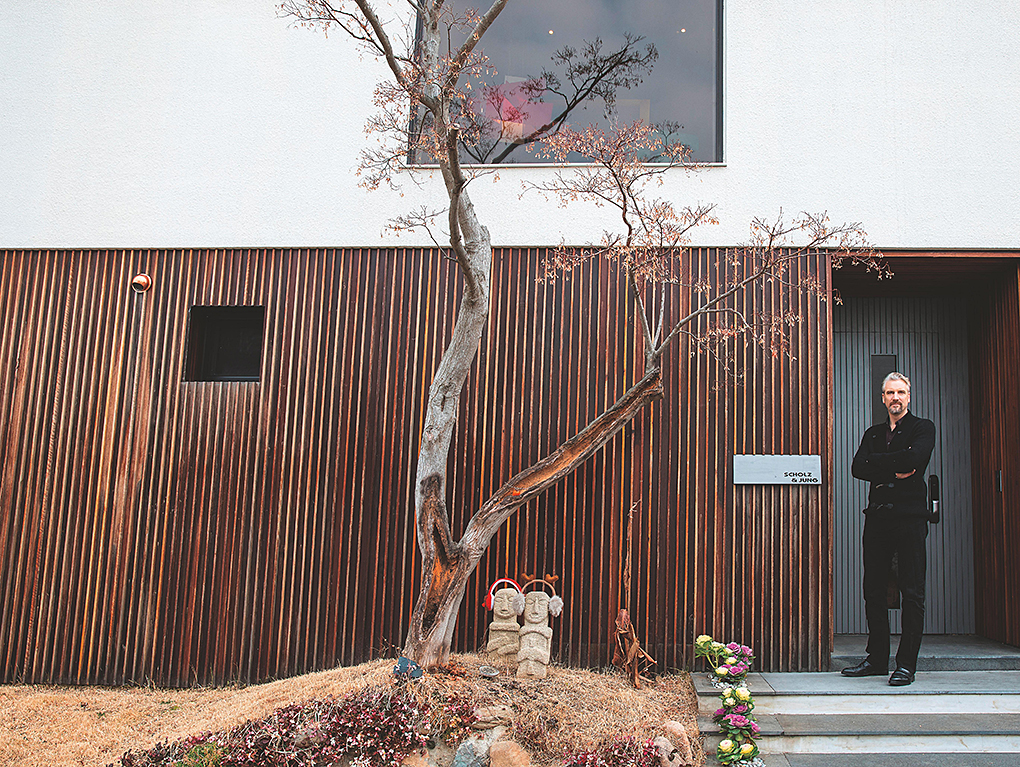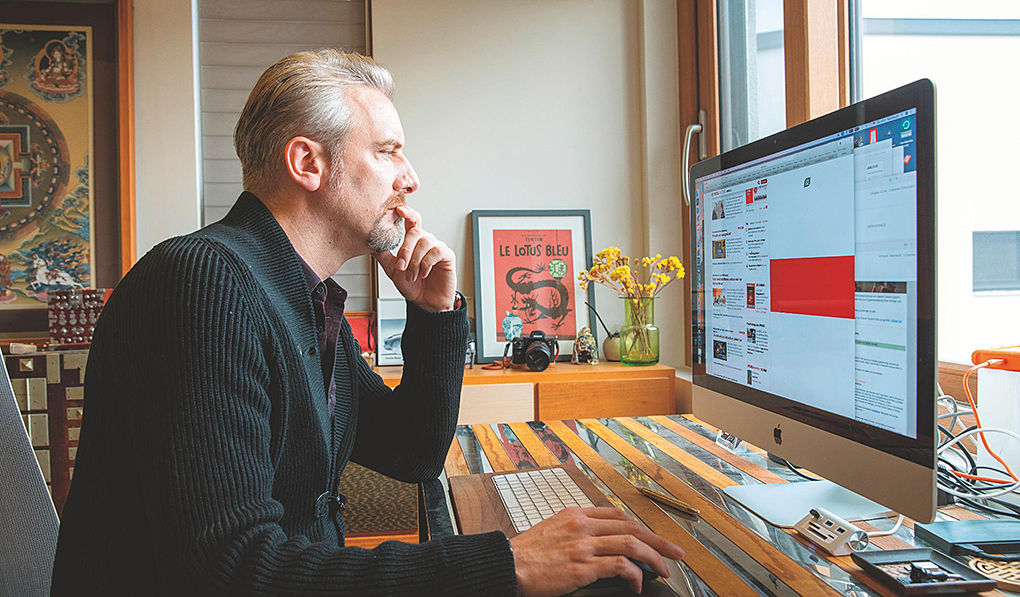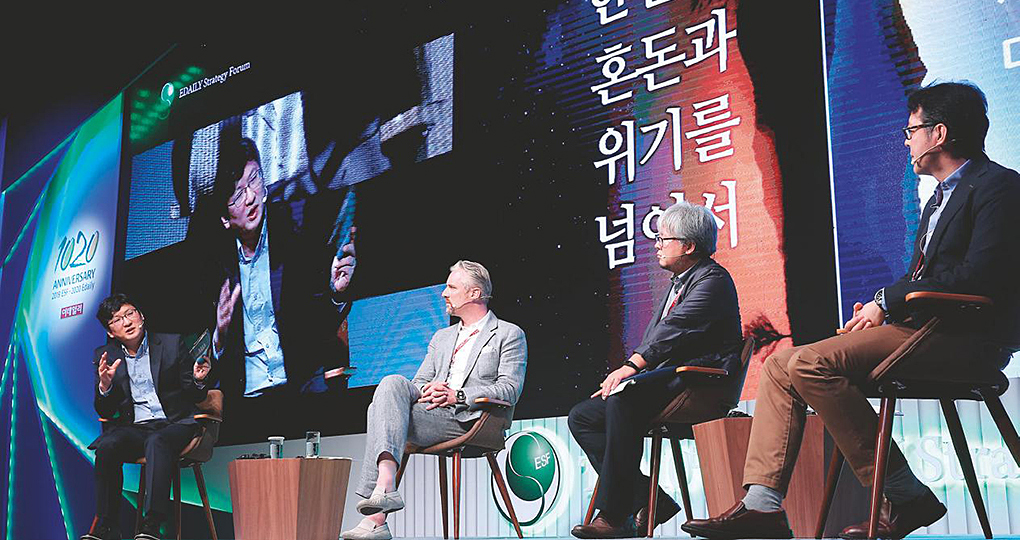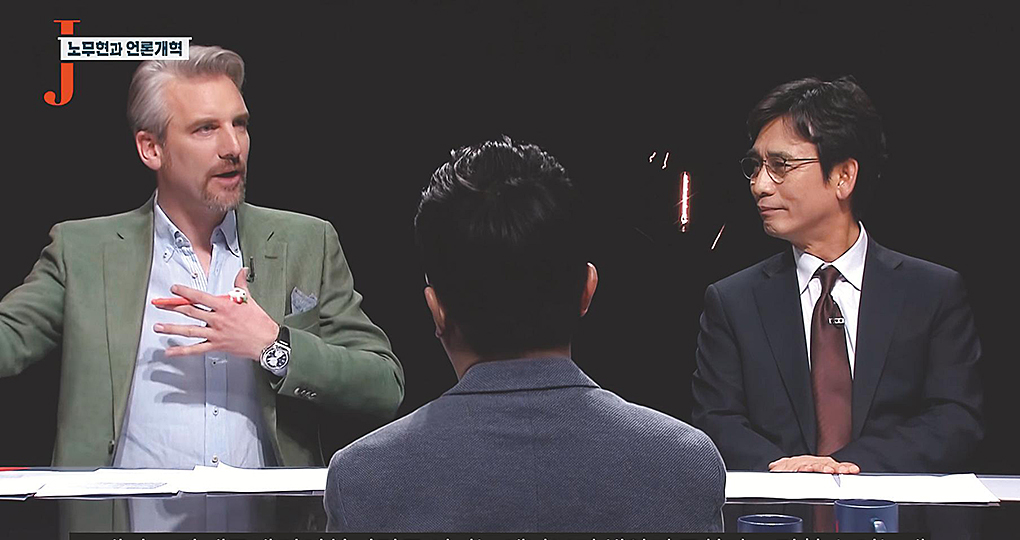Three decades after he began learning taekwondo, Anton Scholz is now a sought-after Korea expert, hard at work as a journalist, businessman and TV celebrity from Gwangju.
At 16, Anton Scholz knocked on the door of a taekwondo studio. Call it fate or simply an impulse derived from his interest in Asia. He says it was karma. Now, 32 years later, Scholz is one of Germany’s most well-known Korea experts.
“As a middle school student, I had lots of interest in the Eastern world – its philosophy, religion and culture,” Scholz said, recalling his teen years in Hamburg, Germany. “My taekwondo master, Shin Boo-young, taught his students not just fighting skills but how to seek the do, or spiritual cultivation.”
While practicing taekwondo, Scholz became interested in Buddhism as well. In 1994, six years after that momentous knock, came the advice of a Korean Buddhist monk who was visiting Germany. Scholz followed that advice and arrived for the first time on Korea’s doorstep. “I intended to go back to Germany after a year or so. Now, as you can see, I’ve been living here for almost half of my life,” he said.

Anton Scholz stands in front of his house,which was built three years ago in Jangdeok-dong,Gwangju. He settled with his family in Gwangjuwhile holding a professorship at Chosun Universityfrom 2003 to 2011.
First Visit
During his early years in Korea, Scholz studied the Korean language at Seoul National University while immersing himself in East Asian studies, delving into topics such as meditation, the Eight Trigrams (bagua, or palgwae in Korean) and Lao Tzu’s thoughts. He then went back to Germany to attend the University of Hamburg. It was one of the few German universities with a Korean studies concentration at the time, and in his first year, he was the only Korean major. Japan and China were the more popular areas of Asian studies.
Since returning to Korea, Scholz has been a consultant, journalist and teacher – alternately or simultaneously. Much of his work involves helping foreigners do business in Korea and advising Koreans about Germany.
Scholz set up a one-stop service company to help foreign businesses smoothly get settled and begin operations in Korea. His company also assisted international participants of the Yeosu Expo 2012, the 2011 IAAF World Championships in Athletics in Daegu and the 2002 Korea-Japan FIFA World Cup finals. Scholz also opened a media firm to arrange translation services, accommodation and transportation for visiting foreign journalists.
From 2003 to 2011, Scholz held a professorship at Chosun University, where he taught German language and international communication. During those years, his family settled in the southwestern city of Gwangju where the university is located.
Formerly an official producer of ARD, a public broadcaster in Germany, Scholz is currently a freelance journalist. He appears as a regular panelist in TV debates and talk shows, and contributes opinion pieces to newspapers. On his business card, he is identified as an “Honorary Representative of the Free and Hanseatic City of Hamburg to Korea.”
“My happiness comes from work. I often think it is regrettable that a day has only 24 hours,” Scholz said. This self-professed workaholic’s relationship with Korea, a country known for having long working hours, is probably inevitable. He is especially busy when inter-Korean relations attract global attention and international TV news crews request help.
Collaborating with these foreign TV crews affords another chance for Scholz to serve as an unofficial cultural ambassador, as he did in 2002 when Korea and Japan co-hosted the World Cup football tournament. At the time, staff members of certain German broadcasters said they preferred Japan, complaining that Koreans often did not honor promises and had poor manners. “I told them their impression was based on misunderstanding,” said Scholz. “And I took them to Korean historic sites on weekends and explained Korean culture. By the time the World Cup was over, my German friends said they liked Korea better.”
“My happiness comes fromwork.
I often think it isregrettable
that a day hasonly 24 hours.”

As a part-time journalist and consultant, Anton Scholz keepsbusy in his study. A well-known Korea expert, he also serves asan unofficial cultural ambassador to promote Korea abroad.
Candid Criticism
Scholz does not hesitate to criticize his host country, specifically its media and educational system. He has misgivings about the way news beats are operated, with certain reporters permanently assigned to cover government agencies or chaebol (family-run conglomerates). His criticism boils down to the media being “too close to sources and too closed to outsiders.”
Another issue is the validity of press reports. Scholz pointed out the news coverage of some 550 Yemeni refugees who arrived on Jeju Island in 2018. The refugees’ applications for asylum sparked a controversy in Korean society, with a debate forming as to whether the government should afford them legal refugee status.
“Opponents spread fake news to incite hateful sentiments about the refugees,” Scholz said. “Even some established media outlets conveyed the stories through their social media sites without checking facts. It turned out later that quite a few of those stories were not true.”
Discussion of the integrity of news media naturally turned to Jürgen Hinzpeter (1937-2016). The German TV journalist filmed the brutal crackdown of Gwangju citizens by government troops during the democratic uprising in May 1980. Owing to his bravery, the world learned about the situation in the Korean city, which was isolated from the rest of the country under martial law. “I respect Hinzpeter. He was a great journalist,” Scholz said. “But I also believe there are still many journalists today who would risk their lives to get newsworthy stories.”
Scholz has helped to make a ary film about Hinzpeter. He also played a minor role in the 2017 film “A Taxi Driver,” which tells the story of Kim Man-seop. The character is based on a real-life taxi driver named Kim Sa-bok, who helped Hinzpeter in his coverage of Gwangju.
Moving on to the topic of German unification, Scholz emphasized that West and East Germany worked strenuously toward that goal and had a dose of good luck and perfect timing. “I think South and North Korea can do the same, although the situation is more complicated on the Korean peninsula, which is surrounded by big powers pursuing different interests.”

Anton Scholz (second from left) participates in the “EconomicWar: What’s to Gain?” section of the 10th EDAILY Strategy Forum,held at the Shilla Seoul in June 2019. © EDAILY

Scholz appears on KBS network’s “Journalism Talk Show J,”in its segment “Ex-President Roh Moo-hyun and Media Reform.”Recognized for his acute analysis and candid remarks, Scholz isa frequent guest on TV current affairs programs.
Tips on Unification
Korean unification may be difficult to achieve anytime soon. Still, Scholz noted that the two Koreas may adopt the “one country, two systems” principle like China and Hong Kong or some other way of unification. The German way should not be the only option, he added.
He expressed regrets about the tendency of Korean people to shun critical advice. “Many Koreans say, ‘You don’t understand our situation.’ But the truth is that many foreigners can understand Korea’s situation, but Koreans often seem unready to accept different views and solutions,” Scholz said.
Regarding Korea’s educational system, Sholz believesthe emphasis is misplaced. “It seems to put focus not on the quality but rather on the quantity of education, thereby destroying students’ creativity,” he said. “Children need to play more and study less. And study should focus on actually learning something and not on just preparing for tests.”
After decades in Korea, Scholz enjoys his second home but does not dismiss the possibility of moving on to new challenges, another door on which to knock. “Time will tell,” he said.
Choi Sung-jinExecutive Editor, Korea Biomedical Review
Ha Ji-kwonPhotographer